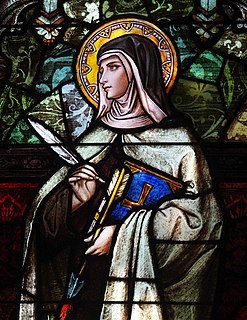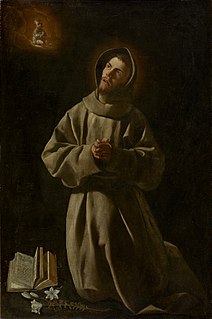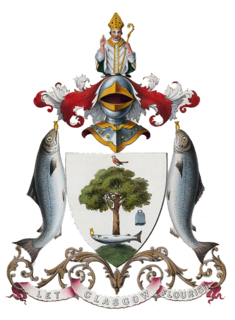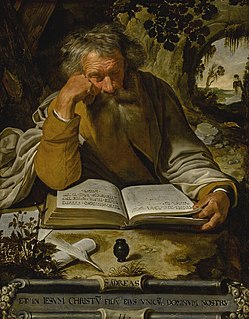Related Research Articles

Aurelius Ambrosius, better known in English as Ambrose, was an Archbishop of Milan who became one of the most influential ecclesiastical figures of the 4th century. He was the Roman governor of Liguria and Emilia, headquartered in Milan, before being made bishop of Milan by popular acclamation in 374. Ambrose was a staunch opponent of Arianism.

Saint Francis of Assisi, born Giovanni di Pietro di Bernardone, informally named as Francesco, was an Italian Catholic friar, deacon and preacher. He founded the men's Order of Friars Minor, the women's Order of Saint Clare, the Third Order of Saint Francis and the Custody of the Holy Land. Francis is one of the most venerated religious figures in history.

Saint Martin of Tours was the third bishop of Tours. He has become one of the most familiar and recognizable Christian saints in Western tradition.

A saint is a person who is recognized as having an exceptional degree of holiness or likeness or closeness to God. However, the use of the term "saint" depends on the context and denomination. In Roman Catholic, Eastern Orthodox, Anglican, Oriental Orthodox, and Lutheran doctrine, all of their faithful deceased in Heaven are considered to be saints, but some are considered worthy of greater honor or emulation; official ecclesiastical recognition, and consequently veneration, is given to some saints through the process of canonization in the Catholic Church or glorification in the Eastern Orthodox Church.

Saint George was a soldier of Cappadocian Greek origins, member of the Praetorian Guard for Roman emperor Diocletian, who was sentenced to death for refusing to recant his Christian faith. He became one of the most venerated saints and megalo-martyrs in Christianity, and he has been especially venerated as a military saint since the Crusades.

Thomas the Apostle, also called Didymus ("twin"), was one of the Twelve Apostles of Jesus according to the New Testament. Thomas is commonly known as "Doubting Thomas" because he doubted Jesus' resurrection when first told of it ; later, he confessed his faith, "My Lord and my God," on seeing Jesus' crucifixion wounds.

Pope Clement I, also known as Saint Clement of Rome, is listed by Irenaeus and Tertullian as Bishop of Rome, holding office from 88 to his death in 99. He is considered to be the first Apostolic Father of the Church, one of the three chief ones together with Polycarp and Ignatius of Antioch.

Saint Nicholas of Myra, also known as Nicholas of Bari, was an early Christian bishop of the ancient Greek maritime city of Myra in Asia Minor during the time of the Roman Empire. Because of the many miracles attributed to his intercession, he is also known as Nicholas the Wonderworker. Saint Nicholas is the patron saint of sailors, merchants, archers, repentant thieves, prostitutes, children, brewers, pawnbrokers, and students in various cities and countries around Europe. His reputation evolved among the faithful, as was common for early Christian saints, and his legendary habit of secret gift-giving gave rise to the traditional model of Santa Claus through Sinterklaas.

Saint Anthony of Padua, born Fernando Martins de Bulhões – also known as Saint Anthony of Lisbon – was a Portuguese Catholic priest and friar of the Franciscan Order. He was born and raised by a wealthy family in Lisbon, Portugal, and died in Padua, Italy. Noted by his contemporaries for his powerful preaching, expert knowledge of scripture, and undying love and devotion to the poor and the sick, he was one of the most quickly canonized saints in church history. He was proclaimed a Doctor of the Church on 16 January 1946. He is also the patron saint of lost things.

Kentigern, known as Mungo, was an apostle of the Scottish Kingdom of Strathclyde in the late sixth century, and the founder and patron saint of the city of Glasgow.

Saint Lawrence or Laurence was one of the seven deacons of the city of Rome, Italy, under Pope Sixtus II who were martyred in the persecution of the Christians that the Roman Emperor Valerian ordered in 258.

Michael is an archangel in Judaism, Christianity, and Islam. In Roman Catholic, Eastern Orthodox, Anglican, and Lutheran systems of faith, he is called "Saint Michael the Archangel" and "Saint Michael". In the Oriental Orthodox and Eastern Orthodox religions, he is called "Saint Michael the Taxiarch". In other Protestant churches, he is simply called "Archangel Michael".

Doctor of the Church is a title given by the Catholic Church to saints recognized as having made a significant contribution to theology or doctrine through their research, study, or writing.

The Latter Day Saint movement is the collection of independent church groups that trace their origins to a Christian Restorationist movement founded by Joseph Smith in the late 1820s.

Jude, also known as Judas Thaddaeus, was one of the Twelve Apostles of Jesus according to the New Testament. He is generally identified with Thaddeus, and is also variously called Jude of James, Jude Thaddaeus, Judas Thaddaeus or Lebbaeus. He is sometimes identified with Jude, the brother of Jesus, but is clearly distinguished from Judas Iscariot, the apostle who betrayed Jesus prior to his crucifixion. Catholic writer Michal Hunt suggests that Judas Thaddaeus became known as Jude after early translators of the New Testament from Greek into English sought to distinguish him from Judas Iscariot and subsequently abbreviated his forename. Most versions of the New Testament in languages other than English and French refer to Judas and Jude by the same name.

Saint Roch or Rocco (lived c. 1348 – 15/16 August 1376/79 was a Catholic saint, a confessor whose death is commemorated on 16 August and 9 September in Italy; he is specially invoked against the plague. He may also be called Rock in English, and has the designation of St Rollox in Glasgow, Scotland, said to be a corruption of St Roch's Loch, which referred to a small loch once near a chapel dedicated to St. Roch in 1506.

Joseph is a figure in the canonical gospels who was married to Mary, Jesus' mother, and was Jesus' legal father. According to Epiphanius and the apocryphal History of Joseph the Carpenter Joseph was the father of James, Joses, Jude, Simon, and at least two daughters from a marriage which predated the one with Mary, a belief that is accepted by some Christian denominations. Perspectives on Joseph as a historical figure are distinguished by some persons from a theological reading of the Gospel texts.

Andrew the Apostle, also known as Saint Andrew, was an apostle of Jesus according to the New Testament. He is the brother of Saint Peter. He is referred to in the Orthodox tradition as the First-Called.

Stephen, traditionally venerated as the protomartyr or first martyr of Christianity, was according to the Acts of the Apostles a deacon in the early church at Jerusalem who aroused the enmity of members of various synagogues by his teachings. Accused of blasphemy at his trial, he made a long speech denouncing the Jewish authorities who were sitting in judgment on him and was then stoned to death. His martyrdom was witnessed by Saul of Tarsus, a Pharisee who would later become a follower of Jesus and known as Paul the Apostle.

The Church Fathers, Early Church Fathers, Christian Fathers, or Fathers of the Church were ancient and influential Christian theologians and writers who established the intellectual and doctrinal foundations of Christianity. There is no definitive list. The historical period during which they flourished is referred to by scholars as the Patristic Era ending approximately around AD 700.